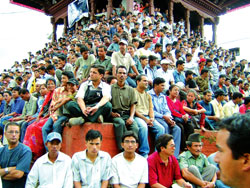|
|
Think what you will, but the debate today over creating a new state structure in Nepal is a direct result of the Maoist uprising. A central question is what a future Nepal should look like: should it be a federation of different states, or continue to function as a centralised nation.
No prizes for guessing what the Maoists want. Two years ago, they introduced the concept of ethnic autonomous regions, a precursor to a federal government.
They have so far 'created' nine ethnic autonomous regions with ethnic autonomous 'governments'. Today, they are pushing hard to institutionalise this structure in the yet-to-be announced interim constitution.
The UML agrees with a federation, though their concept of it is blurry. The NC leadership is pretty much against a federal state divided along ethnic lines. They are for 'true decentralisation of power'. Just how they plan to achieve it, we don't know. The Nepal Sadbhawana Party supports a strong federal structure, but its advocacy is limited to creating a unified and autonomous Madhes region.
Irrespective of the merits or demerits of the federation concept, what strikes me is the Maoist proposal. They have carefully carved up ethnic autonomous states for all the major ethnic groups in this country. Or so it seems, until you look at the 2001 census.
The census shows that the largest group in this country is still the Bahun-Chhettri castes, which comprise 28.5 percent of the population. Yet, there is no autonomous state earmarked for them. Nearly one-third of the nation's population has been deliberately given short shrift as the Maoists intensely woo the other two-thirds. Could this oversight someday lead to a counter-revolution?
I posed this question recently to 'Comrade Biswo', a Bahun himself and senior military commissar of the Maoist's Bethan Smriti Brigade. He replied, "A large section of the population may feel a little alienated at first, but we don't think that will be a big problem." Biswo continued: "The Bahun-Chhettris are spread out in all parts of the country.
They will of course have a share in local autonomy according to their numbers, because we plan to devolve power right to the lowest levels. An ethnic autonomous region does not mean only a particular ethnic group will control the local government. All ethnicities that live in that region will have a say."
In other words, Biswo is saying that an ethnic state will be ethnic in name only. Everyone in it will have proportional representation. The Bahun-Chhettris too will have a say in power according to their numbers.
This is reasonable, until you consider the regional distribution of all communities, and the nitty-gritty of identity politics.
Only in a few regions does any ethnic community completely outnumber the rest. And even that is by a thin margin which can't last forever. The Tharus of the Maoists' Tharuwan Autonomous Region are already outnumbered by the hill tribes, for example.
The other important question is identity. Almost everyone agrees that Nepal's conflict intensified only after the Maoists tactically co-opted the identity question lurking in everyone's minds.
If identity is so important for Nepalis, how can you give identity to some and exclude others? Won't that be sowing the seeds of another, perhaps more violent, conflict in the coming years?
Granted the Bahun-Chhettris have been the classical oppressors/exploiters here. But so have the Newar upper castes, the elites of the Magar, Madhesi, Tharu, and other communities. Yet the Maoists plan to give all of them-except Bahun-Chhetris-an ethnic autonomous region of their own.
"We are going to suffer a backlash for a couple of generations," says a Bahun friend of mine resignedly. "Then what? Won't there be a demand that we too want an autonomous state?"
Identity politics has served the Maoists well thus far. But they're playing with fire. And I, for one, can't see the fire engines.




